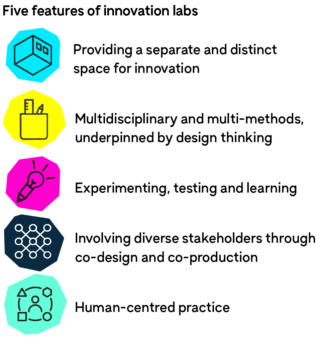This week we are publishing our recent evidence review of social innovation labs, in collaboration with Innovation Unit. In it, we explore what labs are, how they achieve impact now, and how they can achieve more impact in the future.
We commissioned this review to help us consider the future direction for Q Lab, which brings people together to tackle complex issues in health and care. I’ve been struck by how the themes and insights connect with broader challenges in how you stimulate innovation and improvement in complex systems. In this blog, I’m going to walk you through some of the topics in the review that may be of interest.
What is a lab?
Labs can sometimes feel nebulous. The word can be used to describe lots of different types of teams, projects and missions, without much consistency. There is variety in their remit, form and function. To address this, the review highlights features that labs share. These features are consistent across the range of labs in existence.

Defining these features helps us to build an understanding in labs. It also highlights similarities and differences with other innovation and improvement approaches. I don’t imagine the features will sound unique to you – but you may not recognise them all being used at the same time. Alternatively, it may raise the question about whether existing work you are involved in can and should be considered a lab.
To give you an example from my practice, in recent years I’ve built up an interest and experience in systems thinking, perhaps like many Q members. I see similarities between labs and many systems thinking approaches. They both seek to understand issues from multiple perspectives and start by understanding the situation or context before trying to design or implement changes. Some of the differences come in how they approach this understanding or enact change. Systems thinking and lab approaches aren’t the same, but the methodologies can support each other.
Do labs ‘work’ to improve health and care?
The simple answer to this question is: we (still) don’t know. There just aren’t enough labs, enough consistency between them, or enough data and evidence of their impact, to answer this question.
What we have uncovered are areas where the evidence is strongest. Labs are most successful at generating successful innovations, increasing the skills and capabilities of participants, and forging new connections across boundaries. These are consistent with our own experiences running Q Lab. The final area is an enduring challenge for the health and care system, which is highlighted by the latest round of Q Exchange.
Distilling what labs do best, makes it easier to understand the impact you may get. Whether that is about commissioning labs, setting them up or taking part.
What do you need to consider when running a lab?
The section in our report on tensions and trade-offs is where the content gets meaty. We explore issues around:
- evaluation and evidencing impact
- the pros and cons of disrupting from inside or outside a system
- balancing ambition with scant resources
- how to create change for the future while also working with the structures that exist now.
I’d be surprised if these tensions don’t resonate with many of you. There is no way to ‘design out’ these tensions. Instead, you need to consider your strategy for working with these constraints.
How can labs achieve greater impact?
System change is a shared effort. Labs may have their place, but they cannot deliver on their own. Two things can make a difference.
Nobody’s creating systems change until we’re all creating systems change.
Firstly, we need to understand how and where labs can be used through better evaluation and learning practices. This is a challenge that is consistent across other improvement and innovation approaches, and something that THIS institute are also focusing on this in their new evidence series. Alongside this systematic work, sharing our practice also matters. Whether that is through groups like the evaluation special interest group or the wide-ranging events led by members or the Q team.
Secondly, we need to think much more holistically about the range of improvement and innovation activity that is needed in a system to deliver transformation. This is where tools like Q’s improving across health and care systems framework can add value. Achieving systems change is likely to take lots of small pockets of innovation, connecting, and building assets. This is something we’ll be exploring in the Learning and Improving across systems peer learning programme with the Health Foundation and NHS Confederation.
How Q Lab are acting on the findings
We are halfway through our current lab project on reducing waits. Alongside this, we are working with Q’s independent evaluators retrospectively evaluate our projects on mental and physical health, and trust in tech enabled care. We want to better understand the impact we have achieved. We’ll be using the findings from the evaluation, along with insights from the evidence review, to consider what’s next.
If you’d like to be involved, please get in touch.
Want to learn more?
Please read the evidence review and pass it on to people who may be interested.
If you would like to join an online event where we explore the findings in more detail, please let us know and share any ideas for the session. We’ll be in touch with more information.